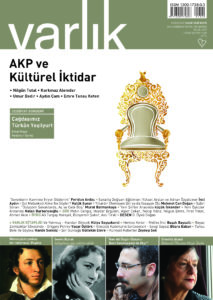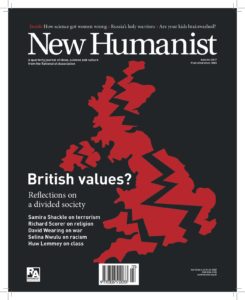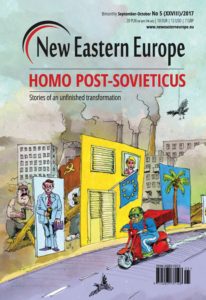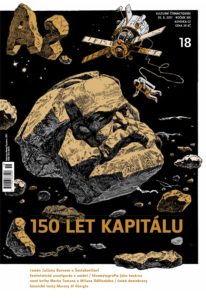A little bit Trump
- Eurozine Review
7/2017
‘Soundings’ focuses on alt-right discourse and media practice; ‘Varlik’ reports from the front line of Turkey’s culture wars; ‘New Humanist’ examines the semantics of counter-terrorism; ‘New Eastern Europe’ identifies a (nearly-)new species; ‘A2’ re-reads Das Kapital 150 years on; ‘Vagant’ challenges conventional wisdom; and ‘Merkur’ discusses Europe between communio and commercium.
Soundings (UK) 66 (2017)

‘In this age of image-based socialized production, it seems everyone is required to hustle and con, to be a little bit Trump.’ In Soundings, media scientist Alison Hearn portrays Donald Trump as heir to Hermann Melville’s ‘confidence man’: ‘Shape-shifting and disorienting, generating his own myriad forms of artifice in the attempt to consolidate his constituents’ trust, he is above all else a conman.’
‘No one really knows what Trump stands for or believes in, and the fact that he changes his positions regularly matters little because, within the logics of promotion and branding, there is no such thing as bad publicity.’ Yet, Trump is merely the poster-boy for a much wider trend: ‘He is both the con man and the con, modelling and propagating the ostensible value of personal self-branding practices for the culture at large while simultaneously giving cover and legitimacy to the capitalist forces that ultimately benefit from them.’
Alt-Right: Annie Kelly argues that US alt-Right extremism is a logical consequence of mainstream neo-conservative discourse on liberalism, manhood and national security post-9/11. The alt-Right is ‘not a political movement in the traditional sense’ but ‘a network of smallish digital social hubs’ that ‘can be broadly characterized as firmly supporting the counter-cultural rehabilitation of the white male individual through a hostile rejection of liberal-left discourse.’
‘It is important not to overstate the numbers of the alt-Right, nor their power as a voting bloc. But, then again, the alt-right is not particularly concerned with numbers. Their success is primarily measured not by levels of recruitment to their ranks but in terms of their ever-increasing dissemination of extreme rightwing ideals and their ability to project an updated rhetoric of anti-left antagonism into the Overton window of acceptable political discourse.’
More articles from Soundings in Eurozine; Soundings’ website
Varlik (Turkey) 9/2017

In Turkey, the purges and upheavals that followed the failed coup in 2016 have allowed President Recep Tayyip Erdoğan to cement his dominance over the military, the judiciary, government and business. But has Erdoğan’s Justice and Development Party (AKP) achieved the same control over culture?
Despite bringing politics, law and military power into its area of control, the AKP ‘has been unable to capture social and cultural power’ argues Nilgün Tutal. Drawing on her research into attitudes towards education and achievement among Turkish families, she suggests that the AKP’s failure to establish cultural hegemony may have its roots in the party’s choice of a ‘doctrinal and dogmatic’ form of Islamism.
Beyond satire: Emre Tansu Keten discusses the appearance of pro-regime satirical magazines in connection with the AKP’s ‘political and cultural hunt against those who do not share their ways of thinking and living’. Keten cites the editorial in the first edition of the post-Gezi magazine Cins: ‘Be afraid. Because we are here to say that you have run your horses enough over places where you consider yourselves owners, caretakers, masters, patriarchs … Let it be known that this magazine’s main area of struggle will be with the false cultural government that some have tried carefully to create in this country.’
Cultural revolutions: Korkmaz Alemdar contrasts the AKP’s drive to control culture with the Kemalist revolutions that swept through Turkey in the 1920s and 30s, a time when there was ‘no option but to develop the medieval Anatolia that the Republic inherited from the Ottomans.’ Conceding that all revolutions lose momentum, Alemdar nevertheless laments the speed with which the Kemalist cultural revolution faded. He has no hope for today’s politicians but urges academics – ‘a group with a measure of autonomy, if limited’ – to examine what they did, or did not do, during the process that has led to today.
Also: Umur Bedir discusses the AKP’s attempts incorporate civil society into the state, and Aydın Çam looks at how TV spreads the AKP’s message.
More articles from Varlik in Eurozine; Varlik‘s website
New Humanist (UK) 3/2017

In New Humanist, Samira Shackle looks at the vexed issue of government programmes to pre-empt terrorism, and when and how the authorities should act. Highlighting the problem of definition – one ‘sign of radicalization’ identified by the British government is ‘vocal criticism of foreign policy’ – she asks: ‘At what point does the exercise of free speech require deradicalization, and who is deciding?’ Shackle shows how approaches differ widely. The Saudi programme, for instance, ‘draws on the theocratic nature of the Saudi state’ by trying to convince people that only it has the authority to declare jihad: not an option available to most governments. In Europe, she writes, ‘it is early intervention that causes most discomfort’, adding: ‘When the definition of extremism is expanded, it has a knock-on effect for everyone: civil liberties, free speech and how we relate to one another.’
Orthodoxy: Marc Bennetts talks to Christians in Russia who are attempting to redefine Orthodoxy. A new film about the now-canonized last tsar that portrays a (non-adulterous) affair has riled up some of the more conservative faithful and led to threats to torch cinemas. ‘People will call you “Christian terrorists”’ Bennetts warns one activist, who shrugs: ‘That’s fine. Let them.’ Ominously, the state – which increasingly identifies itself with the Orthodox Church – seems to be favouring those making threats: ‘Although dozens of Russians have been jailed for “extremism” in recent years, many for the “crime” of reposting social media comments critical of Putin, the police have so far neither charged nor indeed formally questioned anyone.’
BBC: In an unsparing critique of the BBC’s news coverage, David Stubbs writes: ‘It does seem that what the BBC considers “neutrality” is in fact an automatic deference to power.’ Stubbs calls for a more abrasive approach: ‘In times like these, the BBC might do better to rethink its approach to impartiality and balance, and the fiction that it functions as a reliable diviner of political reality. These are not tepid times and the tepidity of its presentation is a misrepresentation of our times.’
More articles from New Humanist in Eurozine; New Humanist‘s website
New Eastern Europe (Poland) 5/2017

The Soviet Union may be gone, but its cultural reverberations continue. In its latest issue, New Eastern Europe sets out, Professor Challenger-style, in search of Homo post-Sovieticus.
Wojciech Górecki introduces us to an ‘international group of photographers, who describe themselves as a “collective” (a communist-sounding name in itself) and call their project Sputnik Photos’. The artists’ most important project to date – they are mostly central European children of the 1970s who remember communism but grew into adulthood in its aftermath – is entitled Lost Territories. Górecki describes one of Sputnik’s works: ‘[an] image of a lonely horse walking along a road. Quite strikingly, the most important object in the photo is the black and white guardrail, the same which can be found along roads from Arkhangelsk to Khorugh. Thus, looking at the photograph we do not know whether it was taken in Russia or Tajikistan; today or thirty years ago.’
Adding some powerful reminiscences of his own, he concludes: ‘The Sputnik photographs can help us understand people who nostalgically sigh when they talk about the Brezhnev times and the Soviet utopia, even if you consider them an aberration.’
Belarus: When it comes to Belarus, perhaps the most faithfully preserved bit of the former Soviet Union, Maxim Rust observes: ‘At first glance, Belarus is the ideal example of Homo sovieticus: for over twenty years the state has been ruled by the same man, the society is passive and does not protest while the democratic opposition is scarce and repressed.’ But, he asks, ‘Have Belarusians ever had a real alternative?’ Rust suggests – somewhat forlornly – of this classically post-Soviet attitude: ‘we should see it as a challenge and potential advantage: subservience and passivity as potential openness; collectivism as a chance to build a civil society.’
Conrad: Douglas Kerr dissects Joseph Conrad’s reflections on imperialism. As Kerr notes ‘We learn far more from Conrad than we do, for example, from Kipling, about the economic realities of European imperialism … Conrad is one of the great chroniclers of this divided, bifurcated, unequal world.’
More articles from New Eastern Europe in Eurozine; New Eastern Europe‘s website
A2 (Czech Republic) 18 (2017)

A2 marks 150 years since the publication of Das Kapital. Ondřej Slačálek opens his comprehensive survey of Marx’s philosophy by criticizing present-day Czech media for rehashing three basic approaches: post-communist triumphalism, Marxist triumphalism and a social science shrug. Slačálek instead scours Marx’s philosophy for elements that may still be relevant today. He sees Marx’s most important legacy in his definition of class conflict, which has lost none of its power to rekindle our sense of moral outrage and solidarity. ‘The key turn that the Left needs to make today is towards the ethical motives that made us join the Left to begin with.’
Post-communist Marx: Ironically, writes Petr Gočev, Marx’s legacy in post-communist Czechoslovakia is most apparent in Václav Klaus’s privatisation policy, which was ‘inspired more by Marx and his followers than by liberal thinkers with their lamentably ideological notion of the origin of capitalism based on voluntary labour’. Marx’s greatest service, according to Gočev, is that he ‘teaches us to question the legitimacy of social institutions and to consider their contradictions and dynamics from the point of view of the unprivileged classes’.
Seeds of discord: Disinformation aims less at changing people’s minds than at sowing discord, argues Lucie Jarkovská. Instead of raging against those who fall for the lies, we should try to understand the other side. ‘Whatever its target – be it certain social groups, human rights, the welfare state, or the world of nature – disinformation is a serious problem. However, if the fight against it exacerbates social intolerance and drives intransigence on both sides to extremes, the result will be exactly what those spreading disinformation set out to achieve.’
More articles from A2 in Eurozine; A2‘s website
Vagant (Norway) 3/2017

Political philosophy is everywhere in Vagant. Even in the dossier on Nordic Libertines, despite it being devoted to think-pieces on literary sex (often bohemian, occasionally perverse). In his editorial, Audun Lindholm quotes Mona Eltahawy (‘The Arab world needs a sexual revolution’) and argues that, in the Nordic countries, cultural views on sexuality have already undergone radical change – in a good way.
Conventional wisdom: Adam Paulsen appreciates the work of the late Rolf Peter Sieferle, whose critiques of Germany’s national guilt complex as unanalytical and its official welcoming of migrants as irresponsible (Finis Germania and The Migration Problem) have brought him posthumous notoriety and huge sales. The outrage is unfair, Paulsen argues. Sieferle, a ‘deep conservative’, struggled intellectually with ‘disappearance of the past’.
Technology dulls the mind: Håkan Lindgren attacks the techie insistence that AI devices will empower humanity: ‘our minds won’t have to stay so small’ (Ray Kurzweil, 2005). Lindgren finds ‘transhumanism’ too single-minded, calling it ‘the twentieth century’s most impoverished notion of utopia’. Quoting Stephen Hawking – ‘AI … could spell the end of the human race’ – he argues that we need more intellectually enterprising visions of the future.
How the future will see us: Andrew Dunker has visited The Long Now Foundation, which is building the ‘Ten-thousand Year Clock’, a multi-lingual, musical, awesomely ingenious and wonderfully photogenic object, which is to be concealed inside a mountain as a monument to our civilisation. TLNF is run by some of the smartest and richest people in the world and is based in San Francisco – where else?
More articles from Vagant in Eurozine; Vagant‘s website
Merkur (Germany) 9/2017

In Merkur, Stefan Krankenhagen reviews the House of European History, which opened in Brussels this year. Despite initial scepticism – some perceived it as a top-down project lacking transparency and inclusivity – the museum convinces, writes Krankenhagen. The museum has benefited from the expertise of the House of the History of the Federal Republic of Germany and makes effective use of tablets to guide visitors through the exhibition, which ‘is rich in objects and themes, but never comes across as arbitrary’.
The idea behind it is, of course, that there exists such a thing as a common European culture and history – the credo that has dominated EU cultural policy since Maastricht in 1992. The EU, it is said, needs a cultural ‘master-narrative’ to complement its economic and political dimension. And yet the museum succeeds in overcoming the limitations of such political interests, writes Krankenhagen. The exhibition gives an impression of Europe’s ability to produce difference: ‘Only by differentiation did the continent become a cultural something … Europe remains a necessary hypothesis.’
Communio or commercium? Support for a European identity comes mainly from older generations, responds Felix Heidenreich. Younger Europeans have a more pragmatic approach and prefer common strategies and solutions. Moreover, the ‘cognitive shortcut’ of identity conceals real differences and conflicts, past and present. By forcing a strong communio while failing to deliver the commercium, the EU creates a dangerous discrepancy: ‘Instead, how about sticking to the treaties (e.g. no bail-out), or countering the impression of lack of government control, thus demonstrating a functioning commercium that need not make excuses for itself by talking about the communio?’
More articles from Merkur in Eurozine; Merkur‘s website
The Eurozine Review presents a selection of the latest issues of Eurozine partner journals, summarizing their contents in English as a way of encouraging cultural and political dialogue between national public spheres in Europe.

Published 15 September 2017
Original in English
Newsletter
Subscribe to know what’s worth thinking about.



